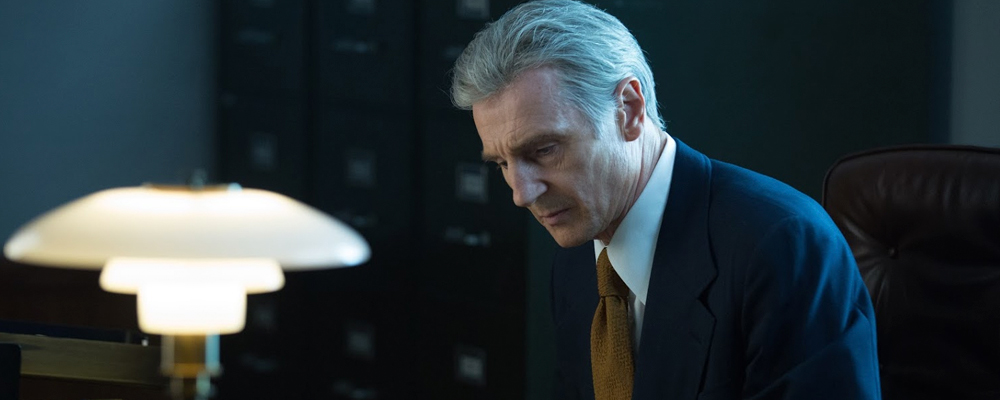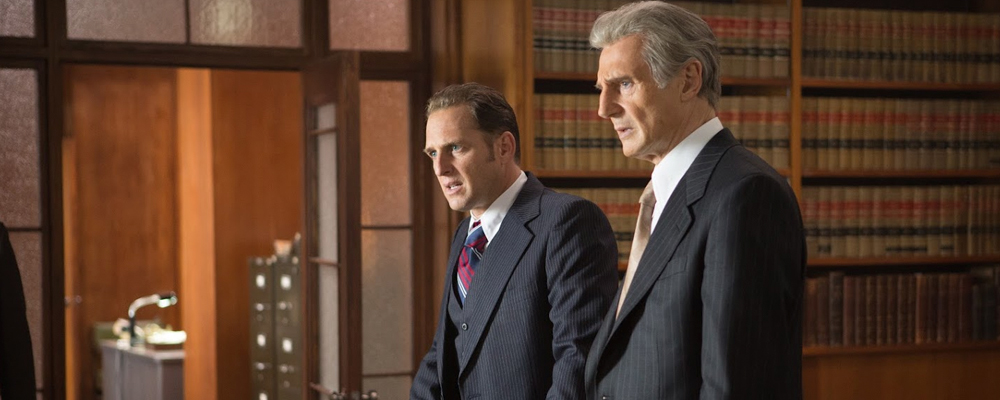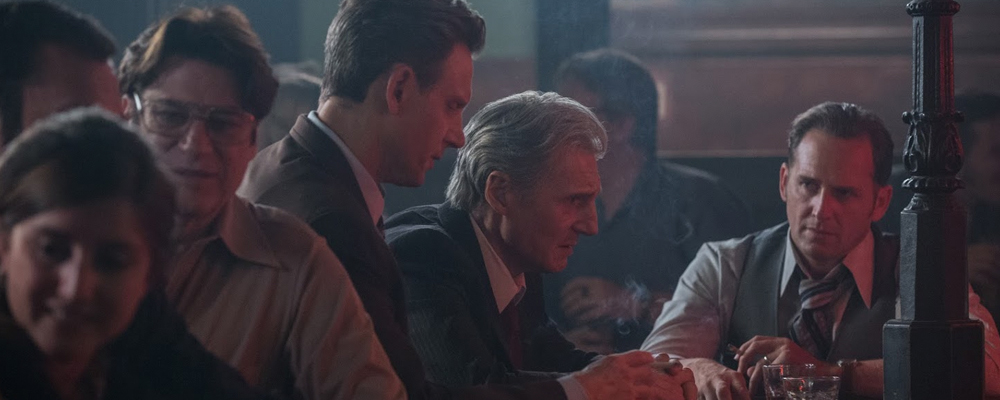Liam Neeson Talks Portraying Watergate’s Deep Throat ‘Mark Felt,’ the Man Who Brought Down Nixon
Frederick Mintchell
Based on a true story of the most famous anonymous man in American history, Mark Felt was the FBI second-in-command who was the infamous “Deep Throat” in the Watergate scandal. The identity of the secret informant remained a source of intense public curiosity and speculation for over thirty years, until Felt revealed himself through an article in Vanity Fair in 2005. While his name has been public for a decade, few know about the personal and professional life of the brilliant and uncompromising Felt, who risked and ultimately sacrificed everything, including his family, career, and ultimately his freedom, to bring what he knew to light.
“Mark Felt: The Man Who Bought Down the White House” shows us Watergate as we’ve never seen it before, flipping the perspective from “All the President’s Men’s” journalists-on-the-street to a view from the highest offices of power, an extraordinary window into a government in turmoil. The story of far-reaching White House corruption, of which the Watergate break-in was only a lone example.
As current events strike startling parallels to the political turmoil of the Watergate era — including power struggles between the executive branch and the FBI, evidence of election dirty tricks, and renewed White House challenges to the veracity of the media — Mark Felt’s story could not be more timely. Written and directed by Peter Landesman (“Concussion,” “Parkland”), Liam Neeson stars as the notorious whistleblower.
Along with Neeson, the film features an all-star cast of Diane Lane, as his wife Audrey; Marton Csokas (Acting FBI Director L. Patrick Gray); Tony Goldwyn, Josh Lucas, Ike Barinholtz, Brian d’Arcy James (FBI Agents Ed Miller, Charlie Bates, Angelo Lano, and Robert Kunkel); Tom Sizemore (Felt’s FBI rival, Bill Sullivan); Michael C. Hall (John Dean); Wendi McLendon-Covey (Felt’s secretary Carol Tschudy); Bruce Greenwood (Sandy Smith); Julian Morris (Bob Woodward); Maika Monroe (Felt’s daughter Joan); Kate Walsh (Ed Miller’s wife Pat); and Noah Wyle (Federal Prosecutor Stan Pottinger).
Though Neeson, who’s from Northern Ireland, was aware of the Watergate scandal as it was unfolding, he was preoccupied with his own nation’s troubles – the Northern Ireland Conflict had started in the 1960s. He trusted that Landesman would help him capture the essence of a man of whom he had known little about.
Neeson went into detail with us about Mark Felt, saying “We were going through our own hellish troubles and political upheaval. There’s stuff written about him but there’s actually very little written about him. I employed a research assistant. There’s a lot of stuff on YouTube. That’s where I found information on Mark Felt. I relied on that a lot.
My research made me aware of the scale of it and how it reinforced in me—and it’s the same with growing up in Belfast—you don’t know who to believe anymore. You’ve been lied to and there’s smoke and mirrors all the time with elected leaders who claim to be representing us, and they have to be held accountable, especially when they break the law. When they think they’re above the law, as Richard Nixon felt, because he was President and whatever he said was above the law and, of course, it’s not.
I wanted to present what Peter Landesman had written—that character. There was very little known about Mark’s relationship with his wife, with his daughter, for whom he was devoted, but she had run off to join a commune. Interestingly, Bob Woodward knew nothing of that aspect of his friend. That shows you just how much Mark Felt was able to compartmentalize his life, and he was trained to do that by [J. Edgar] Hoover and 30 years in the FBI.
In the interviews of saw of him, you thought you could see the man but there was always a screen there. As an actor, I find that interesting. There’s lots of scenes of walking down corridors and talking on telephones and talking to other guys in suits. It’s presenting that and trying to keep an audience interested. These are bureaucrats.
We shot a lot more stuff with Diane [Lane, who plays Felt’s wife, Audrey] that might end up on the DVD director’s cut. I feel saddened a little that we’ve lost some of that stuff for audiences, because as devoted as Mark Felt was devoted to the FBI, he was devoted to her too. She committed suicide after the whole stress; she shot herself with his service revolver. She was under enormous strain. It’s sad.”
While Neeson wasn’t able to speak to any of the real life players, both the director and his co-star were able to perform some in-person research.
“Peter Landesman did [meet Felt]. When Felt gave his interview to Vanity Fair in 2005, that stoked Peter’s interest in the man. He went to see him. I’m sure at that point, [Felt] had some dementia. He was in his early 90s. Diane went and stayed with Felt’s daughter) Joan for 2-3 days, and learned quite a lot, so I was constantly asking Diane for information.
Anytime an actor depicts an historical figure, there’s always something in the research that’s surprising. Neeson describes some of the things that surprised him during his fact-finding homework
His devotion to his wife and his daughter. [There was also this] compartmentalization he was able to do and his colleagues were able to do. He was just very proud of what he did and he was very proud of the Hoover legacy and what he stood for. The FBI and CIA get attacked all the time for nefarious deeds, which I’m sure they do, but I like to think that, ultimately, they’re keeping us safe, when everything’s all added up. [And also] certainly, the FBI.”
Many films have a tendency to portray real life people as one dimensional. A hero is never purely good and a villain is never purely evil. Neeson hopes the film balances these nuances to at least hint at the complexity of the man.
“I didn’t want to play (heroic) 100 percent. He was a very ambitious guy and I don’t think the ambition comes out as much in the script of what the guy was like. He was known around the FBI as a torpedo, meaning he would go through anything in any situation to advance himself. That’s maybe a bit harsh, but there’s never smoke without fire. I think he was very hurt that he was overlooked when Hoover died and he was not promoted to head the FBI. That really hurt him. So, I didn’t set out to play an absolute black and white hero.
The film’s heavily edited. There’s stuff that may end up in the director’s cut. I’m not saying that behind Peter (Landesman’s) back. In any film, there’s stuff that needs to be cut out. I’m surprised that some stuff that I shot with Diane that explains it a little more his situation and the stress they were under for a long time. It showed a lot more of the private man than the bureaucrat and the hero.
When these guys are in their office, they have a screen over themselves. It’s the same with policeman and people in the military—they have to keep their emotions in check because otherwise, they wouldn’t be able to do their job. Fighting wars, arresting people, spying in people—a lot of it is very covert. They’ve been trained—sometimes at great cost to their family life—to keep all this emotion in check, but there are still beating hearts there. They’re still human beings. I hope our film shows a bit of both sides.”
Though much of the social unrest of the period is alluded to, “Mark Felt” is more of an intimate character drama. Though this was probably due to budget constraints, Neeson is wistful.
“I just watched the series, “Narcos,” and I love how they blend the documentary footage with the fictional footage of the series. In an ideal world, where we would have had a bigger budget, I would have loved for our film to show (original footage) like that. There was almost a Civil War in America at that time. What was happening in Vietnam, and the protests over the Vietnam War, was incredible. At Nixon’s inauguration, thousands of people descended on Washington and protested at the White House. They had to put a ring of buses, like covered wagons, around the White House to protect the President in the White House. You had serial killers at that time — the Son of Sam, Charles Manson, the Zodiac killer; you had the Black Panthers, the Weather Underground, hundreds of bombs going off. So, I just wish we could have shown more of that.
Did Peter write a more intimate script? Yes, he did. Maybe if (the film’s producer) Ridley Scott had directed it, it would have been a different script and it would have been bigger (budgeted), but this is what Peter did and I think he did an extraordinary job.
I wish that for younger viewers who may go and see the film there would have been a bigger painting so they could see what was at stake and the travails the country was going through.”
Over the years, there was a great debate as to whether “Deep Throat” was a traitor or a hero. Recently, the actions of Edward Snowden created a great debate as he too was a traitor or a hero. Like many of us, Neeson doesn’t have a clear answer.
“There’s the classic question: Is he a traitor? Is he a hero? What? Certainly, the interviews I’ve seen with him in the past, there’s a legitimate argument for both. Snowden seems to think the public has to see what the government’s doing. The freedom of the press is tantamount to any free society. They have to be able to do their job. I’m not talking about gossip columnists and all that stuff but the real issues. Our elected leaders have to be held accountable.”
Everyone has heard the phrase, those who don’t know history are doomed to repeat it. The Watergate era was a socially and politically turbulent time in America with many Americans questioning and protesting the motives of our government. The events of “Mark Felt” may have happened 45 years ago, but its topicality is just as prescient as ever with Americans questioning and protesting the current administration. Neeson thinks this is healthy.
“You’re a citizen of the country so you have a right and you have a right to protest. I’m not going to attack the Trump Administration—the guy has to be given his time and the Cabinet has to be given its time—but people are out protesting, especially women. It’s great to see people out there protesting again. That doesn’t seem to have happened for many, many years. It’s like, “Yes, get in there. Get on the streets. Make your voice heard. You have a right to protest. It’s great, certainly with the women’s movement.””
“Mark Felt: The Man Who Brought Down the White House” opens in select theaters Sept. 29.




